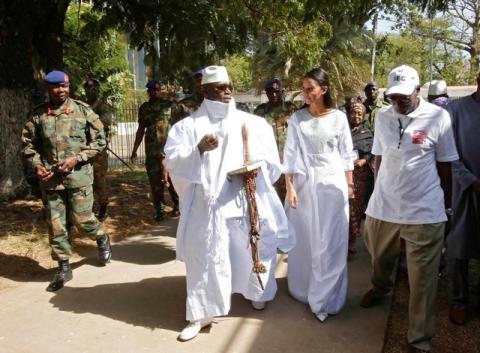Advertisement
West African leaders to press Gambia's Jammeh to quit
BANJUL (Reuters) - Nobel peace laureate Ellen Johnson Sirleaf and other African leaders on Tuesday urged Gambia's long-ruling President Yahya Jammeh to respect the will of the people and step down following his defeat in an election.
Jammeh, who seized power in a coup in 1994 and has earned a reputation as a repressive leader, has declined to relinquish power despite initially conceding that he had lost to opponent Adama Barrow in the election on Dec.1.
He cited irregularities in the official results and on Tuesday morning security forces took over the building of the Independent Electoral Commission which holds the original poll records, its chairman said.
Jammeh's change of mind drew international criticism, and a delegation of West African leaders under the auspices of the regional body ECOWAS was in the capital Banjul on Tuesday on a mission to resolve the crisis.
"We hope that the will of the people prevails," Johnson Sirleaf, who is Liberia's president and ECOWAS chairwoman, told reporters on arrival.
Other heads of state taking part are Nigeria's Muhammadu Buhari, Sierra Leone's Ernest Bai Koroma and Ghana's John Mahama, who lost an election last week and conceded defeat.
Several of them rode in Rolls-Royces with Jammeh's name embroidered on the headrests and then departed for the president's office, a witness said.
"We will be asking President Jammeh to respect his country's Constitution, and to maintain the inviolability of the electoral process," Buhari said on Twitter.
Diplomats say that if Jammeh seeks to cling to power after negotiations fail, neighbors might consider options for removing him by force.
Marcel de Souza, president of the ECOWAS commission, told Radio France International on Monday that sending troops was "a conceivable solution".
The delegation was also due to meet Barrow, who has said he would annul Jammeh's declaration of Gambia as an Islamic republic among other reforms, later on Tuesday.
CHALLENGE
Gambia's president officially has 60 days to hand over power. Jammeh's party intends to challenge the results at the Supreme Court, potentially offering a legal basis for new polls.
"That would put the international community in a strange position and reduce available options," a diplomat said.
Senegal, which surrounds the riverine country of 1.8 million people, called Tuesday's trip a "last chance mission".
However, the African Union said in a statement on Monday that it also planned to send a high-level delegation led by Chad's long-ruling President Idriss Deby.
The role of Gambia's army is seen as key, with the United States saying that some military officers had sided with Jammeh.
Army chief General Ousman Badjie had previously called Barrow to pledge his allegiance, the latter's spokeswoman said, but on Tuesday he told reporters he would support whomever is head of state.
International human rights groups have accused Jammeh, a former army lieutenant, of widespread violations and repression.
He has won four previous elections that were criticized by rights monitors and survived several coup attempts, the latest in December 2014.
He declared Gambia an Islamic Republic last year and in October announced its withdrawal from the International Criminal Court. He also withdrew Gambia from the Commonwealth in 2013, saying it was a neo-colonial institution.
(Additional reporting by Nellie Peyton; Writing by Emma Farge; Editing by Angus MacSwan)



















Add new comment